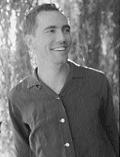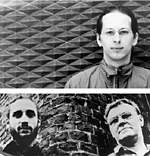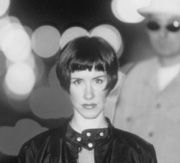AUTECHRE
Showbox, 628-3151, $15 adv. 8 p.m. Wed., May 16
FEW ELECTRONIC GROUPS fashion more cerebral music than Autechre. Where others make do with blips and bleeps, this north England duo have, for the past decade, been layering colorful tones, kinetic whirs, sluggish blurps, and all kinds of other fantastic sounds into a deeply grooved textural soundscape. Their new album, Confield (Warp), is an ominous, densely packed body of sound that isn’t easy on the ears so much as it is fodder for the mind. But that’s not to say that Autechre’s music is glorified wallpaper. Taking instruction from the hands-on nature of early hip-hop and letting their imaginations rule their technology, the pair enliven their sound—both on record and on stage—with unexpected twists and turns.
“We want what we’re doing to be fresh. That’s probably our main focus,” insists Sean Booth, half of Autechre, on the phone from Zurich. “I guess what we want to do is inject something new.” To that end, Booth and longtime partner Rob Brown build their own equipment, write their own programs to manipulate sound, and tinker with the programs while they’re on the road—assuring their audiences of not only a show entirely unlike their recordings, but one with little in common with the previous night’s gig. But Booth is careful in his description of Autechre’s live shows. “As far as we’re concerned, what we’re doing is probably a variant of DJing,” he admits. “It’s probably not really live. I don’t know what is live. If somebody just turns up and presses play on a drum machine, a lot of people consider that live. Most people who play electronic music live don’t play live at all. They just sit there playing fucking MP3s or whatever.”
Another way Booth and Brown try to shape their gigs is to maintain strict control over the entire evening’s events. The band retain full control over the opening acts in each town as well as the DJs who spin in between sets. “We consider the whole night to be the event, not just our hour of it,” Booth explains. “Because otherwise you just end up with everyone round the bar until you play, and that’s not what we want it to be at all. We want people to be into all of it, or to at least experience all of it.” (Also on the bill at the Showbox are San Francisco’s O.F.T. and Rob Hall and Russell Haswell, who will DJ/play laptops between sets.)
MINIMALIST ELECTRONIC MUSIC has only gained in popularity over the last decade, marked by the rise of artists such as Aphex Twin, Mu-Ziq, Boards of Canada, and Mouse on Mars. Some folks call this kind of austere music “abstract techno,” since there are few familiarly shaped melodies or hooks to hang your hat on; others call it “IDM”—or intelligent dance music—because it’s clearly appreciated more by the headphones set than by club kids anxious to get their groove on. But for Autechre—revered as luminaries in the minigenre—these monikers are worse than irrelevant, they’re dangerous.
“I hate genres. I want to kick ’em all in! They should just be binned!” asserts Booth. “I like certain Coil tracks and I really like certain Destiny’s Child tracks. Does that make me weird, just because I don’t fit in one particular box? No, I don’t think so.” Maybe not, but it does make him atypical, since most people buy the music they hear on the radio. “Well, they’re fucking idiots then. They should get computers and make their own music.”
Here, Booth is speaking from experience—since that’s just what he and Brown did as teenagers. The instigator was early hip-hop. “I was really spun out by guys scratching,” remembers Booth, who still follows underground hip-hop and cites recent faves as Slum Village and Jay Dee. “When I first saw someone scratching, I was pretty impressed. I’d been messing around with old tape loops, trying to make not music, but just little sound things, like recording bits of speaking off the TV and playing back at different pitches and layering it over. But I didn’t think about it necessarily as music. It was just something to do. It’s like playing with Legos, isn’t it? I didn’t really think that anyone was going to listen to it”—until he was introduced to Brown, who was experimenting with similar sound collages, and the two clicked. “I guess when we met, we realized that we were both probably pretty creative and unique. Maybe when you see somebody else doing it, it makes you realize that what you’re doing is relevant in some way.” His music also gave a teenage Booth some cred with his schoolmates, who marveled over his unique mixes of songs off the radio.
But obviously, music was more to Booth than currency with the kids. “I’d love to just say that it’s music that makes me want to make music, but it’s not like that,” he explains. “When we first started out doing this stuff, we were really into music. But we were into music because it provided some sort of place to go that wasn’t really necessarily relative to where you were. In fact, if anything, it happened to be almost arelative—like, not-at-all relative.” Cases in point: densely layered tracks like “Pen Expers” and “Pathetic Triangle” from Confield, which are entrancing, with the ricocheting bits of sound acting as a chorus to the central drama of man colliding with machine, taming the beast of his own creation. “It’s like we’ve made a world for ourselves.”








